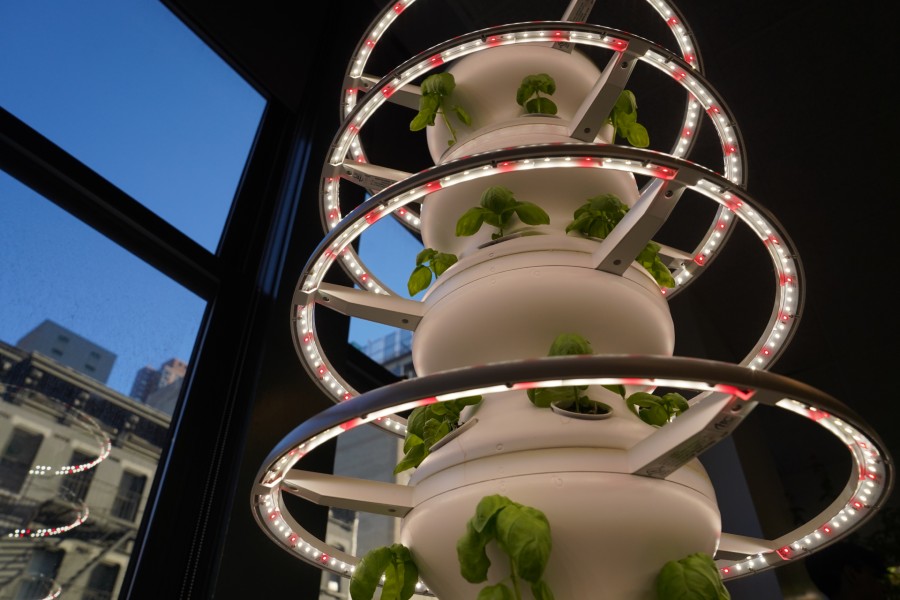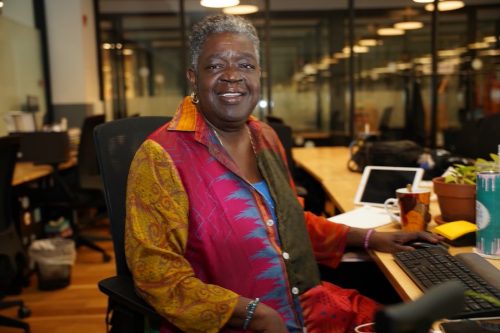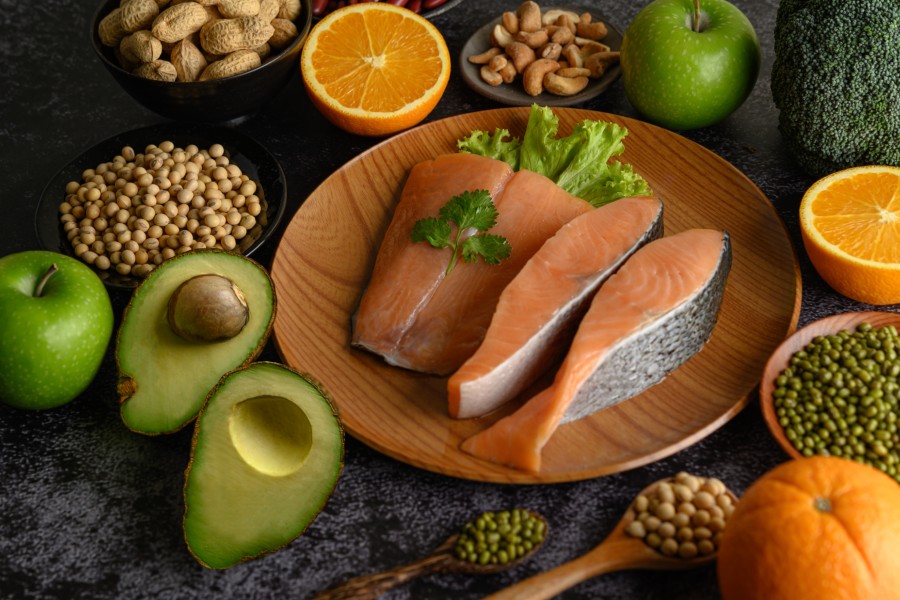
Mayor’s Office of Urban Agriculture (MOUA) Executive Director Qiana Mickie announced today at the High School of Environmental Studies in Manhattan.
The New York City Public Schools’ Office of Food & Nutrition Services (OFNS) is the recipient of $200,000 through federal and state Farm to School grant programs. The funds, allocated by the United States Department of Agriculture (USDA) and New York State Department of Agriculture and Markets (NYSDAM), will be used for agricultural education programming, increasing local food procurement of socially disadvantaged farmers and producers, and establishing learning gardens at public school sites across the city.
“These essential funds are a win for our schools, our families, and our growers – giving students hands-on agriculture learning opportunities in the classroom as well as in community gardens by directly connecting them with socially disadvantaged farmers,” said Qiana Mickie, executive director, Mayor’s Office of Urban Agriculture. “Mayor Adams and Chancellor Banks have long understood the link between healthy food and student wellness. These programs will allow fresh food, innovation, and economic viability of regional farmers to grow hand in hand.”
“Good food is one of the great joys in life. We all deserve to know where ours comes from, and have access to well-sourced, delicious produce. That’s not always so easy in an urban environment like New York,” said Deputy Mayor for Operations Meera Joshi.“Thanks to these transformative USDA and New York State grants, the Farm to School program will support New York’s kids in their healthy food education and prop up socially disadvantaged farmers around New York City. It’s a win-win that wouldn’t have been possible without collaboration from every level of government. Congratulations to the Mayor’s Office of Urban Agriculture, NYCPS, and everyone who made this possible.”
“Schools are the centers of life for families and young people across New York City, providing two free nutritious and delicious meals a day to students, both during the school year and throughout the summer,” said Schools Chancellor David C. Banks. “It is critical that our kids have a strong understanding of where their food comes from, and why it is vital to build healthy eating habits now. I’m thrilled that these grants will allow us to expand food nutrition education programs for our young people, while supporting farmers and producers locally and across New York State.”
“New York State’s Farm-to-School grant program helps to ensure that New Yorkers of all ages and backgrounds, in every corner of the state, have access to fresh, local foods and an understanding of where that food comes from,” said New York State Agriculture Commissioner Richard A. Ball. “We congratulate our partners at the New York City Office of Food and Nutrition Services on securing funding that will help them to further this shared goal in the city and look forward to seeing these exciting projects come to fruition.”








“Our young people deserve access to meals that reflect their local communities, which is why we work to include locally and New York State-grown in our meals wherever we can,” said NYCPS Office of Food and Nutrition Services Senior Executive Director Chris Tricarico. “By helping diverse farmers and producers to move through the procurement process, these grants will help to expand access to locally grown and manufactured foods, serving our students and our communities.”
The USDA Patrick Leahy Farm to School Grant Program supports local farmers and producers by increasing the supply of healthy food in school communities and creating hands-on agricultural learning experiences for students such as planting, harvesting fruits, vegetables, and herbs in the classroom and farm.
The funding will support nine targeted high-need schools in all five boroughs, including the High School of Environmental Studies in Hell’s Kitchen, and cultivate food and economic equity through stronger relationships with local farmers that improve student wellness and education. This investment also reflects USDA’s commitment to equity by reaching historically underserved and marginalized communities.
The New York State Farm-to-School Program was created to connect schools with local farms and food producers to strengthen local agriculture, improve student health, and promote regional food systems awareness. It provides technical and promotional assistance to schools, farms, distributors, and other supporting organizations to bring more local, nutritious, seasonal, and culturally appropriate meals to New York students.
That grant focuses on farm-to-school education for 360 students in six schools across the five boroughs. In collaboration with MOUA and the Cornell Cooperative Extension, OFNS will offer producer training that targets socially disadvantaged and Minority and Women-owned Business Enterprise (M/WBE) urban and rural growers.
The funding will also help facilitate Farm to School agricultural education programming at public school sites across the city and include farmer visits to schools, farm visits for students and a new farmer/producer training with an embedded fast track for M/WBE certification. The farmer/producer training is aligned with Mayor Adams’ goal to increase M/WBE-certified businesses in city procurement and diversify the vendor pool to compete for OFNS school food contracts as well as other agencies’ food procurement contracts. It aims to increase socially disadvantaged farmer engagement in agricultural education and other programming while increasing local procurement from these farmers.
“Farm to School programming not only promotes healthy food lessons – it also increases students’ understanding of the importance of agriculture in climate justice,” said Elijah Hutchinson, Executive Director, the Mayor’s Office of Climate & Environmental Justice. “The USDA and NYSDAM Farm to School grants will give crucial support to high-need schools in all five boroughs to increase food equity and community connection during the school day and ensure the development of future climate stewards and food system changemakers.”
“This historic investment in Farm to School education programming will open impressive new opportunities for both high-need New York City schools and local M/WBEs,” said New York State Senator Leroy Comrie. “By educating students on where their food is coming from and committing to local M/WBE procurement, this program will foster meaningful ties to healthful and environmentally conscious food consumption early on in our city’s youth. I commend the high level of collaboration from the Mayor’s Office of Urban Agriculture across city, state, and federal entities to make this program possible and further encourage their office to continue looking for partnerships to showcase our incredible M/WBE community.”
“The IRC in NY’s New Roots Community Farm is thrilled to participate in the Farm to School program and believes in the benefits of teaching children about where fresh foods come from and where they can learn more about rural and urban agriculture,” said Sheryll Durant, food and agriculture coordinator, International Rescue Committee (IRC), New York New Roots Programs. “Urban agriculture is critical for food justice in schools and communities and much needed in New York City. A huge thank you to MOUA for bringing farmers and students together to expand this great work.”
“Cornell Cooperative Extension Harvest NY is thrilled to partner with the Mayor’s Office of Urban Agriculture and the Office of Food and Nutrition Services on expanding Farm to School programming in New York City and helping New York State producers better understand how to access the market,” said Cheryl Bilinski, program lead, New York Farm to Institution, Cornell Cooperative Extension-Harvest NY. “MOUA and OFNS recognize the need to provide curated technical assistance to producers, specifically socially disadvantaged, and to obtain the resources needed to see it to fruition. We’re grateful to the NYS Department of Agriculture and Markets and the USDA for their unyielding support of Farm to School.”
“The earlier young people learn about the importance of sustainable agriculture and its connection to nutrition and well-being, the greater our strides towards eliminating food disparities, and building more resilient communities,” said Sia Pickett, board member, Just Food. “These grant programs are another step towards a healthier future for New York City.”
Photo credit: 1-9) NYS Department.
- How To Choose The Right Corporate Travel Management Provider For Your Business?
- How Having A Dog Can Enhance Your Overall Mental Health
- 10 Tips To Maximize Your Air Conditioner’s Efficiency
- New Gear For Fall On The Rise For You And Your Harlem Home
- NYIC Launches ‘New York Proud’ Public Art Campaign Celebrating Immigrant Stories Across NYC
Become a Harlem Insider!
By submitting this form, you are consenting to receive marketing emails from: Harlem World Magazine, 2521 1/2 west 42nd street, Los Angeles, CA, 90008, https://www.harlemworldmagazine.com. You can revoke your consent to receive emails at any time by using the SafeUnsubscribe® link, found at the bottom of every email. Emails are serviced by Constant Contact









